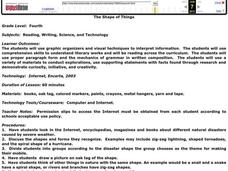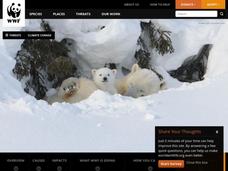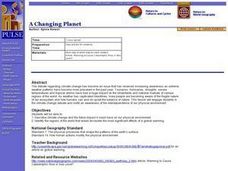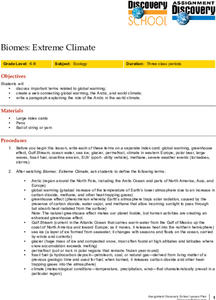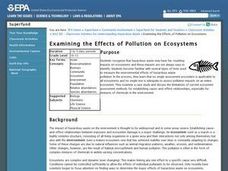Curated OER
Science: The Changing Life of Air Pressure
Fourth graders observe demonstrations how heated air rises and becomes a low pressure area. After watching several teacher-conducted experiments, 4th graders, in groups, discuss and answer questions in their journals. Finally, they...
Curated OER
Earth Processes
Fourth graders explore and discuss the process of evaporation. They discuss how wet things become dry. Students observe the process of evaporation and they make predictions about the observations they make about evaporation. Students...
Curated OER
The Shape of Things
Fourth graders develop their writing skills. In this paragraph structure lesson, 4th graders research natural disasters, compile their findings, create mobiles and write stories based on the mobiles.
NOAA
Waves
Is it possible to outrun a tsunami? After watching a presentation that explains how waves and tsunamis occur, class members investigate the speed of tsunamis triggered by an earthquake.
Curated OER
Science Videos
Students plan, practice, and act in a 2-3 minute videotaped production about a specific topic. Students from a local high school give presentations pertaining to seasons, earth rotation, and moon phases. Students analyze the...
Curated OER
Does Global Warming Increase the Intensity of Atmospheric Natural Disasters?
Students study global warming by communicating the problem, process and solutions. In this global lesson students use graphs, research and write a critical stance on natural disasters.
Curated OER
Global Warming Statistics
Students research real-time and historic temperature data of U.S. and world locations, and analyze the data using mean, median, and mode averages. They graph the data and draw conclusions by analyzing the data. A spreadsheet is used to...
Curated OER
What is a Chemical Reaction?-Evidence of Change
In this chemical reactions learning exercise, students experiment with hydrochloric acid and copper (I) chloride to identify the types of reactions they undergo with various other substances. They also observe the law of conservation of...
Calvin Crest Outdoor School
Survival
Equip young campers with important survival knowledge with a set of engaging lessons. Teammates work together to complete three outdoor activities, which include building a shelter, starting a campfire, and finding directions in the...
Oklahoma State Department of Education
Narrative Prompt
Reading about history is nothing like experiencing it firsthand. Encourage your eighth graders to do the next best thing with a historical narrative prompt, in which they describe the experience of a first-time traveler on the...
Curated OER
Radiation Comparison Before and After 9-11
Using the NASA website, class members try to determine if changes could be detected in cloud cover, temperature, and/or radiation measurements due to the lack of contrails that resulted from the halt in air traffic after the attacks of...
Curated OER
Climate Change And Disease
Students consider the role of climate change in the occurrence of vector born diseases such as malaria. In small groups, they research a specific vector to complete an information chart on climate changes in the region where the vector...
Curated OER
El Niño ~ The Return of El Niño
El Niño sure creates a stir when it comes around! Why not stir up your earth science class with this data analysis activity that examines the temperature and precipitation over the 2002-2003 water year. A tracking chart is provided...
Curated OER
A Changing Planet
Young scholars describe climate change and the future impact it could have on our physical environment. They identify the regions of the world that would encounter the most significant effects of a global warming.
Curated OER
Sustainable Southern Belize: Coral Health Lesson Plan
Fifth graders investigate coral reefs and the dangers they face by labeling and drawing. In this oceanography lesson plan, 5th graders view a PowerPoint presentation of photographs of coral reefs in Belize. Students investigate and...
Curated OER
Biomes: Extreme Climate
Middle schoolers create a web connecting global warming, the Arctic, and wold climate. They write a paragraph explaining the role of the Arctic in world climate.
Curated OER
Extreme Climate
Students discuss global warming, greenhouse effect, permafrost and other key words. In this climate instructional activity students create a web that connects global warming, the Arctic and world climate then write a paragraph...
Curated OER
Defining Drought
Students examine the hydrologic impacts of drought. Humans can change the course of the water cycle, to some extent, to meet their needs, but can they do so without imposing risks on the plants and animals?
Curated OER
The Earth is a Changin'
Students view examples of different types of erosion. In this erosion activity, students discuss the different types of erosion and how erosion changes Earth. Students explore erosion and the effect it has on engineering.
Curated OER
History of the Current
Students, in groups, collect information from the Internet about historical events surrounding the effects of the Gulf Stream current on ship travel. They compile a chart and answer assessment questions.
Curated OER
How to Teach Students about Acid and Acid Rain
How acidic is your rainwater? Use these lesson plans to get students thinking about how acids affect the environment in which we live.
Curated OER
Tornadoes
Middle schoolers examine the characteristics of a tornado. They practice using new vocabulary and participate in a question and answer session. They use the internet to gather more specific information.
Curated OER
Examining the Effects of Pollution on Ecosystems
Young scholars examine the different types of tests used to measure the environmental effects of hazardous waste. They work together to determine the impact of pollution on different ecosystems. They read a case study and answer...
Curated OER
Nothing to Sneeze At
Students explore allergic reactions; they then synthesize their knowledge by creating informational pamphlets that help new allergy patients research the nature of allergies.




